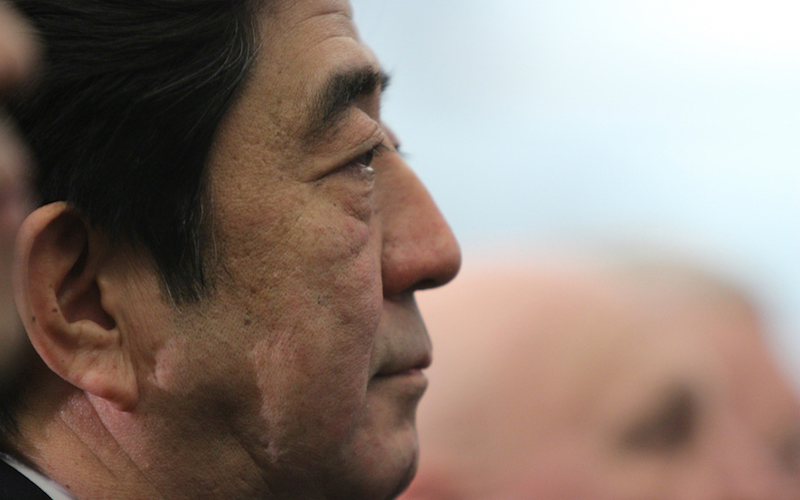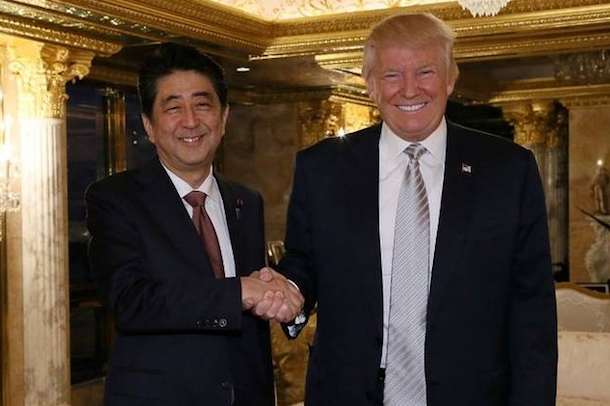
Burying the Hatchet: Shinzo Abe in Pearl Harbor
Later this month, Shinzo Abe will become the first Japanese prime minister to visit Pearl Harbor, the American military base devastated by a deadly Japanese bombing raid that prompted the U.S. to enter World War II. Mr. Abe plans to visit the site during talks with outgoing president, Barack Obama, scheduled December 26-27 in Hawaii, 75 years after the attack which killed 2,400 people.
His gesture exemplifies continued efforts by Japan to reconcile with its wartime foes. As Tokyo contemplates dealing with a new administration in Washington, though, Japanese hopes of repairing relationships with its neighbor, South Korea, suffered a blow, as the impeachment of President Park Geun-hye plunged the government in Seoul into chaos.
During his term in office, Barack Obama successfully deepened the U.S. rapprochement with Japan. In May this year, Obama became the first serving U.S. President to visit Hiroshima, one of two Japanese cities destroyed by American atomic bombs during the war. That initiative, like the Pearl Harbor visit, demonstrates the two countries’ shared determination to overcome their difficult past.
As Mr. Abe joins Obama in Hawaii, there will be understandable anxiety about the future of the U.S. – Japanese relationship, as a new American president takes office in 2017. On the campaign trail, Donald Trump expressed ambiguous attitudes toward some of America’s alliances, and the military commitments they entail. During the first presidential debate, Mr. Trump named Japan as one of countries on a list that he perceived were being defended by the U.S., without paying their way. Therefore, the symbolism of Abe’s gesture could also be timely, and may soften the new Trump administration’s approach to the Japanese alliance.
As the Republican election candidate became President-elect, he moderated his foreign policy views markedly, especially his attitude towards Japan and other allies. The Japanese prime minister will be the first world leader to meet Mr. Trump after his inauguration, at talks are scheduled for January 27. Given that Mr. Abe was also the first leader to visit the President-elect following Trump’s victory in November, and Trump’s statement that Abe is “a uniquely placed figure to offer leadership in the alliance,” it appears that Trump now sees strong links to Japan as a priority.

Trade ties, as well as defense arrangements, are likely to form an important part of those discussions. Japan is the world’s third largest economy, but it is heavily dependent upon exporting goods. Analysts in Japan are worried by the new American administration’s pledge to leave the Trans-Pacific Partnership – a multinational trade deal that covers some 40% of the world economy – and pursues protectionist policies. Yet they are also hopeful that higher U.S. government spending and lower corporate taxes could benefit Japanese companies.
Trump’s team has spoken about Japan playing a “more active role in Asia.” That has been interpreted as a call for the Japanese to “push back” more effectively against Chinese influence in the region. Japan has been wary of provoking its powerful neighbor with displays of military assertiveness, despite U.S. concerns about Beijing extending its influence in the South China Sea. Clearly both countries have a lot riding on their relationship and there are real incentives to maintain a positive momentum during Trump’s term in office.
While there’s room for cautious optimism about Japan’s alliance with the US, Japanese policy-makers will be genuinely troubled by developments in South Korea. The South Korean parliament successfully impeached President Park Geun-hye on December 10, after her administration became embroiled in a corruption scandal involving Park’s confidante Choi Soon-sil, who stands accused of extortion and meddling in state affairs. Park has been stripped of executive powers, while the country’s Constitutional Court considers the case.
It was Park’s government that, together with Prime Minister Abe and Japan, brokered an historic ‘comfort women’ agreement that is credited with improving bilateral relations between the two countries. That deal saw Abe apologize to the Korean ‘comfort women’ who had allegedly been forced to work in Japan’s brothels during World War II. Japan’s government pledged to compensate surviving comfort women and fund a Foundation for Reconciliation and Healing.
However, Park’s recent impeachment stripped her of the authority and legitimacy to implement the agreement, thereby placing diplomacy between Japan and South Korea in a parlous state. South Korean pressure groups and the country’s political opposition criticized the deal, while the neighboring North Korean regime described it as a humiliation. Already, the annual trilateral summit between the leaders of Japan, South Korea and China looks likely to be cancelled, in a further blow to political cooperation and wartime reconciliation in the region. This comes as a blow to America as well, since the agreement was pushed forward by Barack Obama’s administration to further national security interests in the region.
The U.S. and Japan have formed an enduring alliance, strengthened by mutual efforts to deal with the legacy of World War II. Although the Trump administration adds a degree of unpredictability, there is no compelling reason to think that this steadfast relationship will deteriorate significantly during his presidency. In contrast, political chaos engulfing Seoul has imperiled rapprochement between Japan and South Korea at a time when cooperation against an exceptionally aggressive North Korea will be pivotal for regional stability.
It will take substantial resources of goodwill and political guile to ensure that a hard won improvement in diplomatic relations does not unravel completely. As it turns out, not all political leaders are willing to bury the hatchet of war or reckon with their individual Pearl Harbors.
